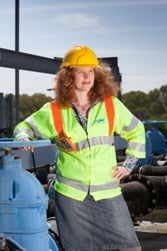Everyone has a part to play in improving water quality
17th November 2015

Waste Water Scientist Jules Florey was invited to speak at a public lecture at Plymouth University's Marine Institute this month to ask the question 'How clean is Plymouth's water?'
Representatives from industry and academics from Plymouth University's Marine Institute hosted a public lecture earlier this month to ask the question 'How clean is Plymouth's water?'
The event looked at how people's activities and behaviour impacts upon the quality of the water in Plymouth Sound, and compared it to the situation 20 years ago.
Paul McNie, Environment Manager, and I were invited to open the lecture with a look at how the behaviour of people living and working in Plymouth can affect water quality.
My thanks go to Martin Atrill of Plymouth University for the opportunity to speak at this event. It was a really enjoyable evening with three diverse speakers covering different aspects of water quality. Over 100 people attended, all with an interest in the environment in and around Plymouth and all with different backgrounds.
Geoff Millward (Emeritus Professor of Marine Chemistry, and Deputy Technical Director of the Consolidated Radio-isotope Facility) spoke about radioactivity, Sean Comber (Associate Professor in Environmental Chemistry, in the University's Biogeochemistry Research Centre) spoke about metal loadings and we talked about nutrient and solids loading into the Sound.
The key message was that "Plymouth's water quality is probably the cleanest it has ever been and it will get cleaner still over the next 15 years."
From our perspective, South West Water is keen to look at innovative ways to improve the quality of the water in Plymouth Sound. We are actively working in partnership with a range of organisations to deliver this and that everyone has a part to play!
Attendees were shocked to see photos of some of the items we have found in our sewers, including rubble, cutlery and even car parts. But we were also able to give some really positive examples of working in partnership with communities, for example to address misconnections, and supporting local organisations such as Rame Peninsula Beach Care.
You can learn more about the event here.
The Marine Institute holds two public lectures a year and I recommend them as a great way to meet local experts and others passionate about our environment.
For further information please contact:
Press Office
South West Water
www.southwestwater.co.uk/contactus
